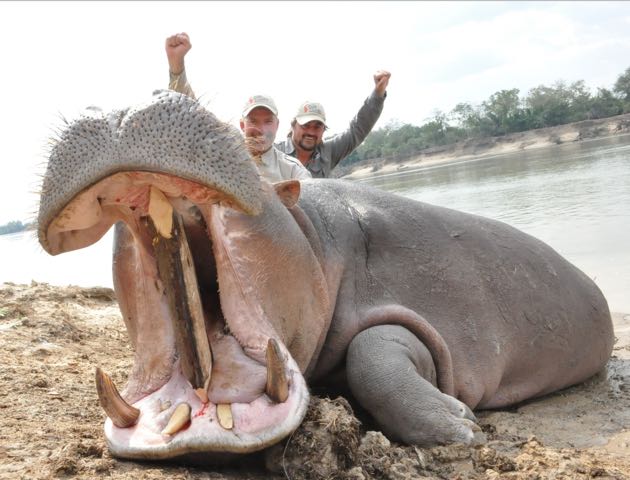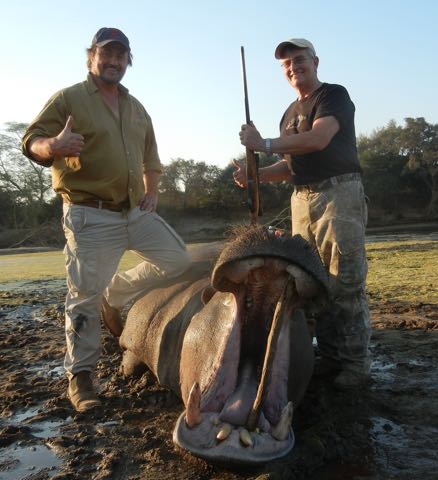HIPPO
HUNTING
Looks can be deceiving!
Ungainly as it is, the hippopotamus is the world’s deadliest large land mammal, killing an estimated 500 people per year in Africa. Hippos are aggressive creatures, and they have very sharp teeth.
And you would not want to get stuck under one; at up to 2,750kg they can crush a human to death
HIPPO HUNTING
Hippopotamuses love water, which is why the Greeks named them the “river horse.” Hippos spend up to 16 hours a day submerged in rivers and lakes to keep their massive bodies cool under the hot African sun. Hippos are graceful in water, good swimmers, and can hold their breath underwater for up to five minutes. However, they are often large enough to simply walk or stand on the lake floor, or lie in the shallows. Their eyes and nostrils are located high on their heads, which allows them to see and breathe while mostly submerged.
Hippos also bask on the shoreline and secrete an oily red substance, which gave rise to the myth that they sweat blood. The liquid is actually a skin moistener and sunblock that may also provide protection against germs.
At sunset, hippopotamuses leave the water and travel overland to graze. They may travel 6 miles in a night, along single-file pathways, to consume some 80 pounds of grass. Considering their enormous size, a hippo’s food intake is relatively low. If threatened on land hippos may run for the water—they can match a human’s speed for short distances.
HAVE YOU EVER WONDERED HY HIPPOS YAWN?
Legend has it that thousands of years ago Hippos were land dwelling animals but the hot African sun meant they were subject to sunburn on their delicate pink ears. So they called a meeting with God.
At the meeting they asked God if they could spend their days in the cool water of rivers and ponds so they could cool their hot bodies and prevent their delicate pink ears from sunburn. God, at first, was not sure about this. He was worried that the Hippos wanted to feast on the numerous fish in the rivers and ponds. The hippos protested at this assumption.
So they decided to make a deal with God. If he would let them spend their days in the cool water they would several times a day open their mouths toward the heavens and show God they did not have any fish in their mouths.
God thought about this proposal and after some time he agreed. So the hippos entered the water and several times a day opened their mouths to show God that they did not have any fish in their mouths. And all this time you thought hippos were yawning!
The key to hunting a trophy Hippo is to be patient. While some old bulls can get a little crany and defensive, 90% of Hippos are shot while they are in the water from about 50 yards away/
Shot placement is key and you should make sure with your PH where to shoot. A brain shot in most cases is desirable, but the hunter always needs to be ready to follow up. He is also backed up by his PH on second and third shots if needed.

The hippo, once shot in the water will sink and then will float within a couple of hours. The goal is to harvest the hippo as close to the shoreline as possible, and in shallow water, from where you can see it and keep an eye on it. Stay away from hunting hippo in a strong flowing river as you might loose your trophy. Once the hippo starts floating, the retrieving part of the hunt starts. It is interesting and sometimes quite dangerous.






Watch your PH or one of the trackers wade and swim into crocodile and hippo invested waters to tie a rope around the hippo. (Sometimes in deeper waters, a small boat is used).
The hippo will then be dragged onto shore with the help of a safari vehicle or through manpower provided by local villagers.
Most of the times, only the scull with tusks and the hippo skin is retrieved, and the meat gets used for feeding the villagers, or in some cases for Lion Bait (In the latter case the decision is made out of necessity and not choice.
